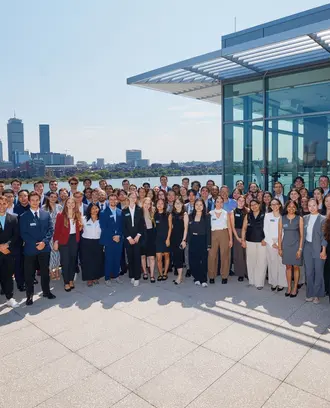Raphaëlle Delpont, MBAn 2020
Raphaëlle Delpont, currently a Machine Learning Engineer at San Francisco start-up Crossing Minds, always wanted to pursue a technical degree in data science so she could bridge the gap between research and industry. Throughout her academic career in France, she had experienced gender bias. So Raphaëlle was excited to find her perspectives as a woman embraced by the MIT Sloan community—from her application journey to her capstone project at a cybersecurity company in Boston.
Women are still underrepresented in data science and big tech. What challenges have you experienced from your academic career to your current industry role?
When I entered my studies, I was one of six young women in a class of 45 students. Throughout my academic career, I would come across people who wouldn’t pay attention to what I was saying or who thought that the ideas I contributed weren’t valid. Because of this, I could see why women might not be attracted to these kinds of technical fields.
While this is a deeply rooted issue, I think that part of the solution is to keep making changes step by step. Much to my surprise, my experiences in the capstone at MIT Sloan and in my current role at a startup have been so positive. I was able to join teams that included women in key positions, and my perspective as a woman was valued by both men and women in these companies.
What tips do you have for prospective students—especially women—who are interested in pursuing careers in data science?
First, make sure you’re pursuing data science because you’re interested in it, not because you feel it’s a trend. Study this field because you want to solve problems by analyzing and building solutions. Find out what motivates you. Data science is huge and very diverse in the challenges it is looking to solve—the diversity of courses at MIT enables you to explore your interests and discover your passions.
My advice is: Dare to do it. I almost didn’t apply, but someone from the MIT community encouraged me to do so. There are a lot of people in the MIT Sloan community who are ready to help you in your application journey.
Did you have any experience in data science before you decided to apply to MIT Sloan?
Before coming to MIT Sloan, I was pursuing my engineering degree in France, and was mainly focused on machine learning and operations research. These majors were very technical and becausee I lacked self-confidence, I came close to choosing other majors. But during that time, I realized that I could really make an impact in those two fields later on in my career. I always knew I wanted to pursue a technical degree, and applying to MIT Sloan was a good decision for me.
Why did you choose the Master of Business Analytics program at MIT Sloan?
I wanted to bridge the gap between research and what’s applied in the data science industry. MIT provided the opportunity to develop my skill set, meet people with noble goals, and gain credibility in my field. The MBAn program is intense due to the workload, the other student activities you manage, and the deep relationships you build with classmates. I met so many great people who continue to inspire me. When I consider different life options, I know that I can turn to them for advice. I can’t wait to see what they accomplish in the future.
Did your experience at MIT Sloan meet your initial expectations?
I learned so much more about data science operations than I ever thought I would because of all the research projects that I was involved in. During the Analytics Edge course, for example, we studied cases by looking at data models that can be used for day-to-day projects. For the Analytics Lab course and the capstone, we had a lot of companies visiting Sloan to pitch their companies. This helped me understand the challenges facing big, modern companies. I imagined they’d have full teams applying state-of-the-art technology, but that wasn’t the case. It was so exciting to help develop and apply new solutions for some of these well-known companies. It made me realize that there are opportunities for improvements everywhere and that people who work hard can really have a big impact facing all those challenges.
Tell us about your capstone experience.
When the time came to choose my capstone, I wanted to do something a bit research oriented. Not all capstones offered had this component. Some of them are more business oriented, though in all of them you’re expected to communicate clearly and help find solutions for your capstone’s unique challenges.My capstone was at Rapid7, a cybersecurity company in Boston. My capstone partner, another MBAn student, and I were tasked with researching a “lateral movement attack.” We had no clue how to do this, so we went through full days of research—reading papers, summarizing our insights, developing an algorithm, and finally applying the algorithm in production.
How has COVID-19 impacted the nature of your work?
I work for a small machine learning company in San Francisco. Like any other company, we’re all currently working from home. However, I was able to meet with my teammates face to face by adhering to strict COVID-19 precautions, wearing masks, and social distancing. It was great for me to start with the team and get to know them. Last year’s MIT Sloan convocation speech by Dean Schmittlein talked about learning to adapt. Many startups and other companies have been successful in doing so. I think this is excellent advice and this pandemic shows the importance of this skill.
What goals drive you today?
My main goal is to bridge the gap between research and industry. Right now, I’m more focused on the technicalities of being a machine learning engineer, which at the moment, is really interesting to be immersed in. I want to collaborate with people who address challenges with efficiency—within a company that wants to have a positive impact on the world.



